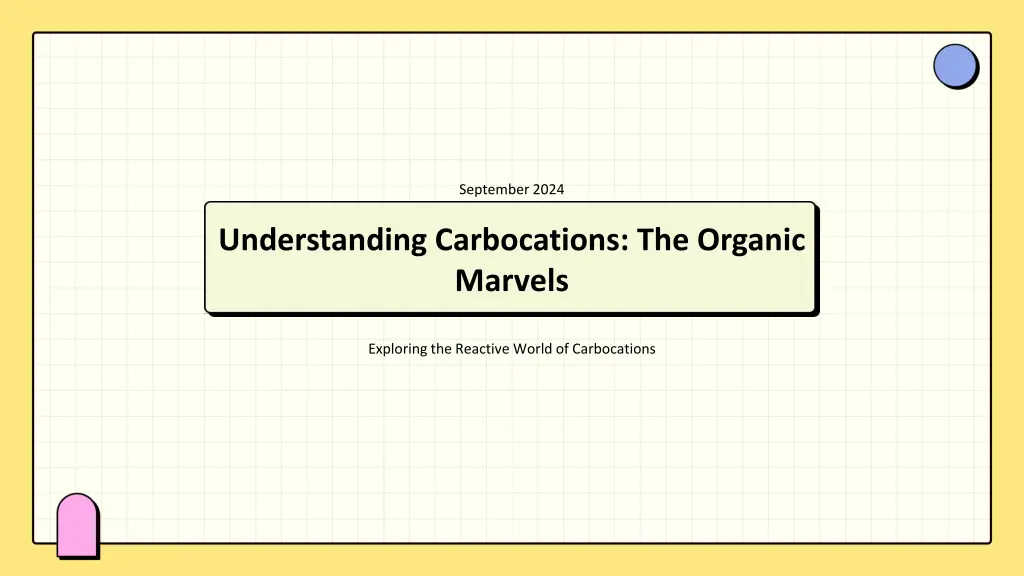
Understanding Carbocations in Organic Chemistry
Explore the world of carbocations, organic marvels with a positive charge on a carbon atom. Learn about their formation, structure, stability, and practical applications in organic reactions. Understanding carbocations is essential for mastering organic chemistry reactions.
Uploaded on | 3 Views
Download Presentation

Please find below an Image/Link to download the presentation.
The content on the website is provided AS IS for your information and personal use only. It may not be sold, licensed, or shared on other websites without obtaining consent from the author. If you encounter any issues during the download, it is possible that the publisher has removed the file from their server.
You are allowed to download the files provided on this website for personal or commercial use, subject to the condition that they are used lawfully. All files are the property of their respective owners.
The content on the website is provided AS IS for your information and personal use only. It may not be sold, licensed, or shared on other websites without obtaining consent from the author.
E N D
Presentation Transcript
September 2024 Understanding Carbocations: The Organic Marvels Exploring the Reactive World of Carbocations
Table of Contents 5 Applications of Carbocations 1 What is a Carbocation? Conclusion: The Significance of Carbocations 6 2 Formation of Carbocations The Structure of Carbocations 7 Thank You! 3 Stability of Carbocations 4
What is a Carbocation? 1. A carbocation is an organic ion with a carbon atom that has a positive charge. 2. This occurs when the carbon atom possesses only six electrons in its outer shell, creating a highly reactive species. 3. It s notable for its sp2 hybridization, where one p-orbital remains unoccupied. 4. Due to this unique structure, carbocations are crucial intermediates in organic reactions. 5. They are sometimes referred to as carbonium ions, emphasizing their positive charge.
Formation of Carbocations 1. Carbocations can form through various mechanisms, primarily through the loss of electrons. 2. A common pathway is the ionization of alkyl halides, where a leaving group departs, facilitating the carbocation's creation. 3. Protonation of alkenes can also generate carbocations under acidic conditions. 4. Understanding these mechanisms is vital for mastering organic reactions. 5. These formations explain why carbocations are often considered reaction intermediates.
The Structure of Carbocations 1. Structurally, carbocations have a trigonal planar shape due to sp2 hybridization. 2. This geometry allows for effective overlap in bonding, despite the vacant p-orbital. 3. The positive charge resides on the carbon atom, significantly affecting its reactivity. 4. Due to the planar arrangement, carbocations are influenced by sterics and electronic effects. 5. Recognizing their structure helps predict the stability and reactivity in reactions.
Stability of Carbocations 1. Carbocation stability is a crucial concept in organic chemistry. 2. Stability generally increases with more substituted carbocations, owing to hyperconjugation and inductive effects. 3. Tertiary carbocations are more stable than secondary and primary due to the presence of electron-donating groups. 4. Understanding these stability trends aids in predicting reaction outcomes. 5. This knowledge is essential for chemists in designing synthetic pathways.
Applications of Carbocations 1. Carbocations are not merely theoretical constructs; they have practical applications in synthesis and reactivity. 2. They play pivotal roles in various organic reactions like alkylation and rearrangements. 3. Moreover, carbocations are vital for understanding reaction mechanisms and kinetics. 4. Their unique properties make them targets for synthetic organic chemistry. 5. Applications extend from pharmaceuticals to materials science.
Conclusion: The Significance of Carbocations 1. In conclusion, carbocations are fundamental to the understanding of organic chemistry. 2. Their role as reactive intermediates offers insights into reaction mechanisms. 3. As we delve deeper into their properties, we unearth the intricate dance of electrons within molecules. 4. Carbocations enhance our comprehension of stability, reactivity, and synthetic possibilities. 5. Embracing these concepts enriches our approach to organic synthesis.
Thank You! 1. Thank you for exploring the fascinating world of carbocations with us. 2. We hope this presentation has sparked your interest in organic chemistry. 3. Feel free to reach out with any questions or further discussions. 4. Let s continue to uncover the mysteries of chemical reactions together! 5. Your engagement in this topic is invaluable to our shared learning journey.
